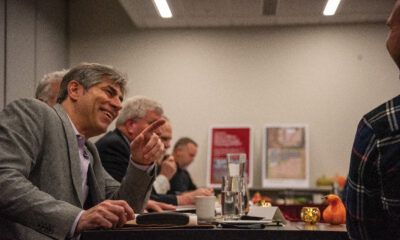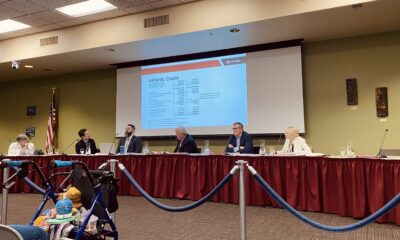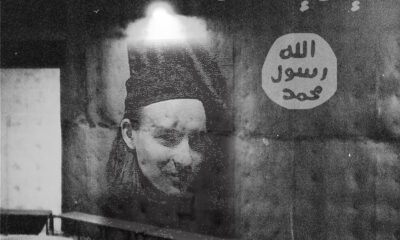There was a heaviness at Coeur d’ Alene’s Human Rights and Education Institute as students and community members filed in. Tissues were placed at each table and lights were set low as a group of candles flickered. The mood was solemn yet hopeful as attendees gathered to remember and honor the lives of transgender people lost this year to hate crimes in the United States.
The vigil was hosted by NIC’s Gender and Sexuality Alliance (GSA) and the North Idaho Pride Alliance. Featuring four different speakers and one song performance, the event opened with some words from GSA Vice President Samuel Ganieany, who says many LGBTQ folks hide who they are for fear of violence, judgment and even death.
Ganieany spoke to the violence committed to trans folks in today’s society: “…acknowledging that just because it’s known, it’s still a danger, it’s still something we need to be addressing.”

GSA President Lizzy Welker honors the victims by speaking about their lives. Photo by Willow Tree.
This can be especially true here in Idaho considering the state’s hate crime law, titled “Malicious Harassment,” does not include sex, gender, gender identity, or sexual orientation as criteria for harassment. According to the FBI, in 2017 gender identity only accounted for 1.6% of bias-motivated crimes in the United States, though reliable information about violence and oppression toward transgender people can be difficult to find due to lack of education and awareness about LGBTQ issues and consistency in reporting.
“Being transgender isn’t killing people; it’s the culture we live in…It is embedded in our culture that trans people have no value. I call bullshit, in the biggest way,” said North Idaho Pride Alliance Member Juli Stratton.
To honor each victim, GSA President Lizzy Welker spoke a little about the life of each trans person that had been killed and presented a slide show including their photos and names. As a new face came onto the screen,

GSA Vice President Samuel Ganieany blows out a candle to represent the extinguished life of each Trans person killed this year in the US in a hate crime. Photo by Willow Tree.
Ganieany blew out a candle, signifying their death. Many of those in the photographs were victims of violent deaths like shootings and stabbings. Many were trans women of color who make up the majority of transgender people killed in the U.S. according to the Human Rights Campaign.
“How many more must die until we open our eyes? We are more than numbers on a cold November night. We are more,” were lyrics of Kai Keith’s original song that was performed during the event.
Speaker Jessica Patricia Hoffer said this is a night to also remember “those who stayed hidden for fear of being ostracized by their community.”

Kai Keith performing an original song. Photo by Willow Tree.
As the event came to a close, Stratton offered words of encouragement, understanding, and hope.
She spoke about her own personal relationship to gender and conflict even within the LGBTQ community saying, “I watch other groups, especially social media groups fight with each other because somebody’s not doing it right…there is no such thing as not being trans enough or not being this enough. That if I’m exactly who I am, and who I’m meant to be, that is enough.”
Stratton urged folks to share their stories, stating the importance of visibility and being strong together in community. She said that everyone is responsible for creating a new culture of safety and acceptance.
“We owe it to those who have died, those who are missing, those who we don’t even know about, and to the living who fight against indifference and cruelty, hatred and dehumanization,” Stratton said. “We need to talk about why people are dying and what needs to be done.”
After the last speaker, those attending were urged to connect with each other and enjoy the homemade soups and food provided. Many stayed after to talk and offer support after an emotional evening. Some folks perused the back tables where ‘Ally’ pins, information about better understanding transgender and non-gender-conforming people as well as other resources available courtesy of the North Idaho Pride Alliance.
“If you’re an ally, speak up,” Stratton said. “If you’re a trans person, be safe and speak up. I don’t know the answers. I don’t have the roadmap but together I truly believe that we can change this culture.”
















